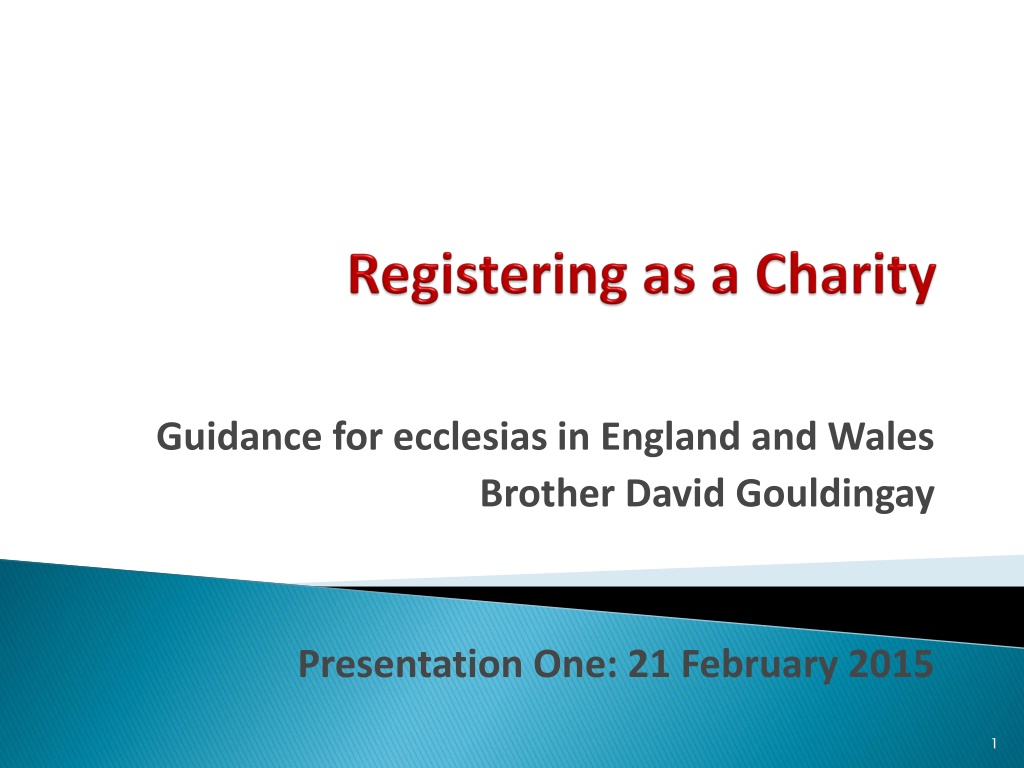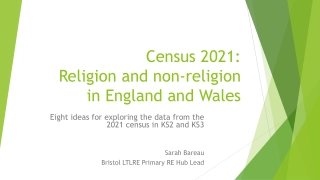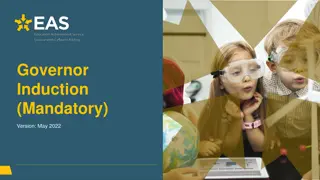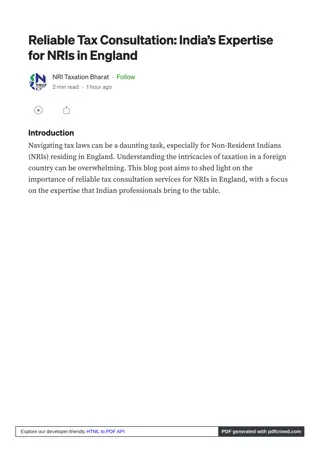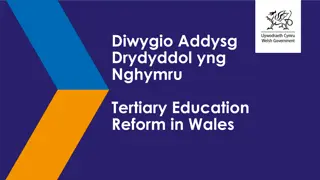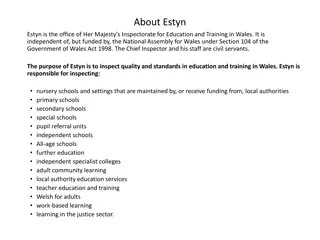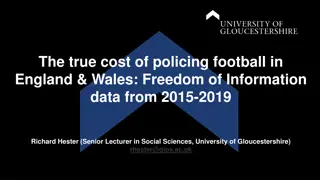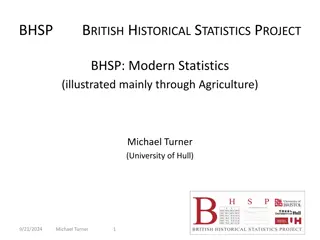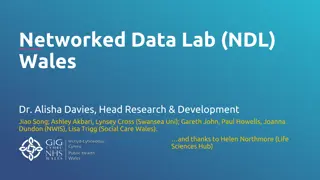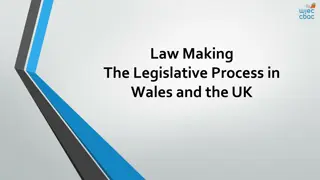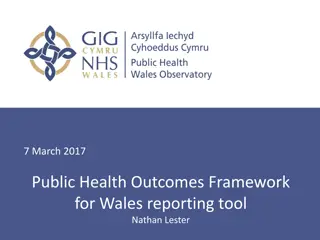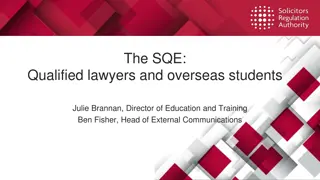Guidance for Ecclesias in England and Wales - Presentation by Brother David Gouldingay
Understanding the criteria for a charity in England and Wales, including charitable purposes, public benefit, and the advancement of religion. Exploring how ecclesias can meet these requirements through open worship, preaching, and public engagement. Emphasizing the importance of a constitution reflecting the beneficial nature of the religion advanced.
Download Presentation

Please find below an Image/Link to download the presentation.
The content on the website is provided AS IS for your information and personal use only. It may not be sold, licensed, or shared on other websites without obtaining consent from the author. Download presentation by click this link. If you encounter any issues during the download, it is possible that the publisher has removed the file from their server.
E N D
Presentation Transcript
Guidance for ecclesias in England and Wales Brother David Gouldingay Presentation One: 21 February 2015 1
A charity is an organisation which is: 1. Established for charitable purposes only ; and is 2. Subject to the control of the English High Court 2
A charitable purpose is: 1. One listed by the Act, which includes the advancement of religion; and 2. Is for the public benefit. To be a charity, both conditions must be satisfied. 3
Yes, in that their solepurpose is to advance religion, which should be stated in the constitution s objects. However, an exclusively charitable motive would be undermined where there the religion advanced has an additional non-charitable motive, for example: - Profit (other than for exclusively charitable use) - Political - Private members club 4
Yes. Typically demonstrated by three factors: 1. Meetings for worshipopen to the public 2. Religious beliefs are preached to the public 3. Some degree of public engagement collections or activities that directly or indirectly benefit the public Public benefit is not undermined because an ecclesia is partly inward-looking, but would be if it was totally inward-looking, i.e. it assumed the non- charitable status of a private members club 5
Public benefit has two aspects: Both must be met to be a charity: 1. The benefit aspect; and 2. The public aspect 6
The religion advanced must be beneficial to the public. Typically achieved by ecclesias through three factors: 1. Meetings for worshipopen to the public 2. Religious beliefs are preached to the public 3. Some degree of public engagement collections or activities that directly or indirectly benefit the public Public benefit must be capable of description, and then set outwithin the constitution of an ecclesia proposing to register 7
To advance Bible-based Christian faith to the glory of God and the honour of Jesus Christ in accordance with the Christadelphian Birmingham Amended Statement of Faith, annexed hereto, for the benefit of the Christadelphian community and members of the public, particularly in and around [relevant locality] through: Holding meetings, open to the public, for worship, prayer, breaking of bread by Christadelphians and Bible teaching; Preaching to the public through personal engagement and/or by invitations to preaching/teaching meetings and/or by other means; Engaging with the local public through the provision of Sunday School and/or youth club(s) and/or other occasional activities; Engaging with the wider Christadelphian community and wider public through periodic collections for charitable needs, including collections for disaster relief; and Serving, to the extent feasible, the pastoral and other welfare needs of ecclesial members and others. 8
Any detriment arising from the advancement of the religion must not outweigh the benefit of the charitable purpose itself. The Equality Act 2010 grants exemptions for religious or belief organisations which permit restriction of ecclesial membership, participation in ecclesial activities and services provided, or use of ecclesial premises, on the grounds of religion or belief or sexual orientation. Qualifying conditions arise but are capable of being met. The different role of sisters might the detriment of sex discrimination be argued successfully by the public? This has not happened yet. But, if it one day were, could the claimed detriment ever outweigh the benefits of the religion advanced by Christadelphians? 9
The charitable purpose must benefit: the public in general, or; a sufficient section of the public in practice satisfied by the locality where the ecclesia meets; and not give rise to more than incidental personal benefit , meaning financial benefits and goods, services, or other benefits in kind. 10
Welfare benefits may be paid to a member of an ecclesia, provided that the following conditions are satisfied: Constitution contains power to make welfare payments, preferably specific. However, one is already implied by expressing Christian love. Person who benefits must be in need, e.g. by reason of youth, age, ill health, disability, financial hardship or other disadvantage. No trustees are to benefit, unless specifically authorised to receive such benefits by the constitution an implied authority cannot be used here; Beneficiary does not participate in the decision to make the payment; Aggregate payments areproportionate i.e. private benefit to the members must notoutweigh the public benefit of charitable activities. 11
Tea and biscuits after preaching or worship meeting? Acceptable.Incidental to main object. Seat on bus to Sunday School outing? Acceptable.Incidental to main object. Ecclesial meals arranged at the hall? (1) Fraternals. Acceptable?Incidental to Bible study? (2) Social meals. Acceptable?Incidental to fellowship? An acceptable welfare payment for the young, the aged, the unwell, disabled or in financial need? Yes! But ought others who are able to contribute do so? Practical suggestion: if unsure, take a collection or make available a box for anonymous contributions by those who feel able and willing to do so. 12
Registration as a charity with the Charity Commission is legally required when the following conditions are met: 1. The ecclesia is exclusively charitable, (i.e. it advances religion without any additional non-charitable motive) AND 2. Religion is advanced for the public benefit (i.e. is not in the nature of a private members club - preaches and offers access to worship etc) AND 3. Its annual income from all sources (including collections taken for onward transmission to community organisations) exceeds 5,000. Possible exceptions for some ecclesias to this general rule will be discussed by KHR 13
Are there any immediate legal penalties, civil or criminal? No. What actions could the Charity Commission take? 1. Demand information relevant to possible need for registration through a court order. Possible as more Christadelphian ecclesias begin to register. Refusing to comply with a court order would be a criminalact. 2. If charitable registration criteria were then met: a. Require registration if the ecclesia is to continue; or b. Force winding up and closure, conceivably appointing an external agent to sell any hall and other assets and distribute cash elsewhere (to other charitable organisations, including registered ecclesias, most probably within the Christadelphian community) as the charity is wound down to closure in an orderly manner. 14
Are there any reasonable grounds to think so? No. The law is now too well established. Could the 5,000 annual income registration threshold increase? Unlikely. An increase from 5,000 to 25,000 recommended by the government s own adviser was rejected. 15
For members No day-to-day changes are likely to be felt. For arranging brothers Astrustees, the arranging brothers havemore formal responsibilities for managing the charity, although in practice these responsibilities already exist for ecclesias that are already unregistered charities. Key duties of trustees/arranging brothers: - Good governance (management) practices - Preparation of an annual trustees report and accounts - Completing an online annual return - Reporting serious incidents arising, if any, to the Commission 16
Initial tasks: - Gaining understanding of charity law - Assessment of any duty to register, or legal reasons not to - Communication with the ecclesia - Ecclesialdebate and decision consequences of actions - Managing any registration process or other agreed action Good governanceis informed by six principles, which serve to: - Increase awareness of legal/constitutional requirements - Require some formal planning/minuting of agreed actions - Highlight risk management processes - unfamiliar to some - Ensure trustee conflicts of interest or loyalty are managed 17
Trustee report and accounts: - Annual exercise - Report format can be largelystandardised after first report - Report how public benefit is met largely standardised - Keep accountsto simple receipts and payments format - Needs independent examination if annual income > 25k Reporting serious incidents : - Significant financial loss - Serious harm to beneficiaries (especially vulnerable ones) - Serious criminal, illegal or terrorist use of the charity - Deliberate use of charity for significant private advantage - Other significantabuse impactingon public trust 18
Constitution, with its stated objects, must legally be complied with. Trustee AB s bear legal responsibilityfor a charitable ecclesia - they cannot be instructed by members to break either charity law or rules set out in the constitution. Changes to the constitutionare possible, using the constitutional process, but changes may never undermine original objects. Assets placed into an ecclesial charity may thereafter only be used for that ecclesia s charitable objects. On closure of a charitable ecclesia (for whatever reason)funds cannot ever be returned to members. 19
Exemption from tax on any income and capital gains, e.g. rental income or sale of ecclesial hall but proceeds must then be used for charitable purposes. Recovery of basic rate income tax on donations from individuals made under the gift aid scheme. Additional tax recovery on small cash-only donations (below 20 each) of up to a maximum of 1,250 per annum, without gift aid declarations. Relief from business rates Some Stamp Duty Land Tax and VAT savings e.g. zero rate on preaching advertisements 20
Charity law potentially affects all ecclesias! See Detailed Guide! Collate objective facts & evidence of relevance to the ecclesia. Discuss relevant scriptures in the light of facts and evidence. Assess legal and tax consequences of registering or not registering - these may be very significant so should be thought through very carefully. If not registering, pursue and document a legally acceptable basis. Whether registering or not,seek some professional advice. 21
